 If you have been reading my recent blogs, you know I believe the following four skills are key for making conflict productive: calm, compassion, curiosity, and creativity.
If you have been reading my recent blogs, you know I believe the following four skills are key for making conflict productive: calm, compassion, curiosity, and creativity.
As I’ve said in previous blogs, these skills–or what I like to think of as “conflict competencies”–are so simple in theory, but so hard to put into practice. Doing so not only requires rewiring our brains and developing new tendencies and ways of being; it also demands that we buck social norms and expectations. And that is not only difficult; it can be downright scary!
I therefore believe that we need to develop an additional important, overarching skill or conflict competency in order to make conflict productive in our personal and professional lives: courage.
What is courage?
According to various dictionaries, courage means “the ability to do something that frightens one;” “strength in the face of pain or grief;” or “mental or moral strength to venture, persevere, and withstand danger, fear, or difficulty.”
As these definitions imply, courage isn’t about being fearless; to the contrary, it is about taking action and standing strong in the face of fear. Or as Brené Brown (who is known for her research on courage, vulnerability, shame, and empathy) puts it, there is no courage without vulnerability, which she defines as uncertainty, risk, and emotional exposure.
In other words:
Courage is not: being reckless or fearless.
Courage is: showing up, leaning in, and taking action when something feels scary, dangerous, risky, or potentially painful.
Why does courage matter when dealing with conflict?
To make conflict productive, we have to:
- Embrace the reality that conflict just is. A first step in making conflict productive is to accept the fact that conflict is a normal, healthy, and unavoidable part of life; it isn’t inherently a threat; and it can be an opportunity if skillfully handled. To do this, we have to shift out of a win-lose, scarcity mindset to instead focus on the ways we can create value through working through conflict productively. To make this shift, we have to be vulnerable to acknowledge that we likely have not been dealing with conflict productively in many aspects of our life, and we have to have the courage to do things differently going forward.
- Operate from a place of calm (i.e., neurological regulation). To approach conflict skillfully instead of defaulting to destructive tendencies (such as attacking or avoiding conflict), we have to be in a calm, present, open state of mind. Shifting to seeing conflict as a normal part of life and one that can be an opportunity if skillfully handled, rather than seeing it inherently as a problem, will help make this easier. However, we also have to become aware of when we are getting dysregulated and explore what is making us feel afraid or otherwise triggered. We also have to learn to soothe our minds and neurological systems so we can return to a state of calm. This necessitates deep self awareness, vulnerability, and taking responsibility for your state of being and actions. And that all takes courage.
- Approach ourselves and each other with compassion and curiosity. To make conflict productive, we have to understand what really matters to us and others (i.e., our fundamental needs or concerns, or our “interests”) and to identify what would truly be a good outcome from the conflict situation. To do this, we have to offer ourselves and others compassion so we can get beyond judgment and assumptions to instead be curious and explore what is really going on, what really matters for everyone involved in the conflict, and what would be a productive resolution of the situation. We also have to be vulnerable and accept that we might not be “right” and others might not be “wrong”, and to be open to having our hearts and minds changed. That all demands courage.
- Co-create mutual gains outcomes. At the end of the day, a productive outcome from a conflict situation is a solution that addresses the issue at hand (e..g., how to manage Great Salt Lake in a sustainable way or how to resolve a recurring issue at work) and meets all involved parties’ key fundamental needs. If involved parties can get beyond their positions to instead focus on their fundamental needs and concerns, and if all parties can approach each other with compassion, curiosity, and creativity, then they can work together to co-create innovative solutions that create value for everyone involved. Getting to this place of creativity requires suspending assumptions (such as about what is and isn’t possible and what people will and will not do), thinking outside of the box, and being open to different ways of thinking about the issue and pathways forward. That kind of openness requires vulnerability and courage.
How to approach conflict with courage
Simply approaching and leaning into conflict when it feels scary or risky is an act of courage. However, if we do so in a way that isn’t calm, compassionate, curious, and creative, we are unlikely to get to productive outcomes and, instead, may contribute to the spiral of destructive conflict. So how do you approach conflict with courage in a way that is likely to help you and others get positive outcomes?
The basic answer to that question is that rather than defaulting to whatever tendencies we have developed for dealing with conflict (such as avoiding conflict, adding fuel to the fire when dealing with conflict, dysregulating when encountering conflict, etc.), we have to take responsibility for being more skillful in how we approach and navigate conflict. This blog and my past EDR Blogs provide some insight for how to do that.
The best part is that when we approach conflict courageously and skillfully, we also help others approach conflict more productively. And the more skilled we and others get at working through conflict productively, the less scary conflict becomes. In fact, when all involved parties approach conflict courageously and skillfully, it becomes fun–for when we have the courage to approach conflict from a calm, compassionate, curious, and creative place, we can create amazing outcomes.
 Danya Rumore, Ph.D., is the Director of the Environmental Dispute Resolution Program in the Wallace Stegner Center at the University of Utah. She is a Research Professor in the S.J. Quinney College of Law and a Clinical Associate Professor in the City and Metropolitan Planning Department at the University of Utah. She teaches about, practices, and conducts research on conflict, negotiation, dispute resolution, leadership, and collaborative problem solving. She is also the Founder and a Co-Director of the Gateway and Natural Amenity Region (GNAR) Initiative.
Danya Rumore, Ph.D., is the Director of the Environmental Dispute Resolution Program in the Wallace Stegner Center at the University of Utah. She is a Research Professor in the S.J. Quinney College of Law and a Clinical Associate Professor in the City and Metropolitan Planning Department at the University of Utah. She teaches about, practices, and conducts research on conflict, negotiation, dispute resolution, leadership, and collaborative problem solving. She is also the Founder and a Co-Director of the Gateway and Natural Amenity Region (GNAR) Initiative.
About the EDR Blog: Hosted by the Wallace Stegner Center’s Environmental Dispute Resolution (EDR) Program, the EDR Blog shares ideas, tools, and resources to cultivate a culture of collaboration and help readers be more skillful in working through conflict. Read additional blog posts.
